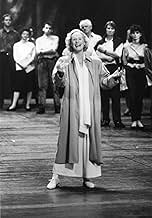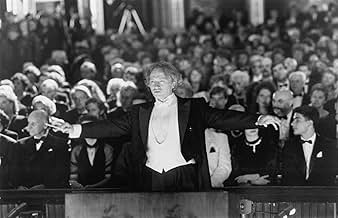IMDb RATING
6.6/10
1.5K
YOUR RATING
Hungarian conductor plans bold "Tannhäuser" production amid opera politics, artistic egos, nationalism, union conflicts, and funding challenges in critique of Grand Opera and European Union.Hungarian conductor plans bold "Tannhäuser" production amid opera politics, artistic egos, nationalism, union conflicts, and funding challenges in critique of Grand Opera and European Union.Hungarian conductor plans bold "Tannhäuser" production amid opera politics, artistic egos, nationalism, union conflicts, and funding challenges in critique of Grand Opera and European Union.
- Awards
- 3 wins & 2 nominations total
Johara Farley
- Dancer
- (as Johara Racz)
Dieter Rita Scholl
- Delfin Van Delf
- (as Rita Scholl)
- Director
- Writers
- All cast & crew
- Production, box office & more at IMDbPro
Featured reviews
This film is much more than a customary movie about opera, though opera lovers get first-rate extracts from Wagner's Tannhauser as well. The action takes place in an imaginary "Opera Europe" in Paris. István Szabó, the excellent film director is really interested here in fanatic people of the theater who came from several countries of Europe to unite their talent in order to create a successful performance of Wagner's youthful masterpiece. The ensemble is a mixture of multinational people: the head of the company (a Spaniard, a former hero of the Spanish Civil War,) her private secretary and mistress (descendant of a noble Russian family,) the conductor (a talented young Hungarian who suffers from inferiority complex because of his East-block origin,) the singer who plays Tannhauser (a permanently offended dumpy man from the DDR with beautiful voice,) the French theatrical technician (a pig headed trade unionist who causes much trouble,) etc. They carry with themselves all good and vicious habits and traditions of their origin which cause many conflicts but humorous episodes as well during the rehearsals. There is a remarkable scene when at a dinner party the protagonists put aside all of their conflicts and sing together a song called "Suliko" which was once Stalin's favorite. (They sing it not because they love Stalin, but because of a certain nostalgia for their youth.) In the center of the story stands the Hungarian conductor's and a Nordic singer's (played by Glenn Close) stormy love affair which ends in diminuendo (using here deliberately this term of music.) Strongly recommended for everyone who loves art and theater.
Lord, how I love this movie!
I have been a Wagnerphile for most of my adult life. The entrance music at my wedding (30+ years ago) was from Parsifal. I hum leitmotifs when I'm feeling good. And when I really want an emotional catharsis, I put on "Meeting Venus."
I watched it again, after several years' hiatus, a few nights ago. I laughed out loud time and again and sat with tears streaming down my face during the finale. What a wonderful film!
I recommend this time and again to my music-loving friends. Imagine "Best in Show" and "A Mighty Wind," set in Paris, produced by the BBC, and with an international, stellar cast of both performers and voice talent. (Not to put down the Christopher Guest ensemble, but consider Glenn Close, Kiri Te Kanawa, et. al., - really!)
Raise the curtain!
Spiritus ex Machina
The universe is not only stranger than we imagine, it's stranger than we CAN imagine!
I have been a Wagnerphile for most of my adult life. The entrance music at my wedding (30+ years ago) was from Parsifal. I hum leitmotifs when I'm feeling good. And when I really want an emotional catharsis, I put on "Meeting Venus."
I watched it again, after several years' hiatus, a few nights ago. I laughed out loud time and again and sat with tears streaming down my face during the finale. What a wonderful film!
I recommend this time and again to my music-loving friends. Imagine "Best in Show" and "A Mighty Wind," set in Paris, produced by the BBC, and with an international, stellar cast of both performers and voice talent. (Not to put down the Christopher Guest ensemble, but consider Glenn Close, Kiri Te Kanawa, et. al., - really!)
Raise the curtain!
Spiritus ex Machina
The universe is not only stranger than we imagine, it's stranger than we CAN imagine!
this movie, besides giving the casual viewer a glimpse into the operatic world, also affords the viewer a casual glimpse into the world and the business, of music making, and it ain't pretty. but it's accurate.
as a professional musician in an international setting for more than 25 years, let me assure you that the evils of the music business are all here on display, and they are represented accurately: complaining musicians, managers for whom the word 'know' was replaced by the word 'no' at an early age (perhaps in their infancy), smarmy interfering union reps, and please God, save us all from short conductors with bleeping inferiority complexes.
and then there are the operatic singers. oh my!! (dr. georg szell called opera singers, " 'unmusical beasts', who have to have every note beaten into them by a vocal coach". this is true, by my experience).
the only really weak moment that i noticed was when the conductor left the podium during a rehearsal to knock on the door of the singer. this is absolutely improbable/impossible in my experience. conductors get their 'power' by being on the podium. they do not leave the podium
orchestra conducters get/force sex by more sordid means, not by leaving the podium.
this movie has a lot to recommend it, on many different levels- check it out.
i give it a 9.2.
watch it in a 'Robert Altman' frame of mind, i think that you will see what i mean.
it's not 'terror in tiny town'. and it's not, 'the godfather, part one'. it's somewhere in between. it's really a fine movie.
thanks. alvink
as a professional musician in an international setting for more than 25 years, let me assure you that the evils of the music business are all here on display, and they are represented accurately: complaining musicians, managers for whom the word 'know' was replaced by the word 'no' at an early age (perhaps in their infancy), smarmy interfering union reps, and please God, save us all from short conductors with bleeping inferiority complexes.
and then there are the operatic singers. oh my!! (dr. georg szell called opera singers, " 'unmusical beasts', who have to have every note beaten into them by a vocal coach". this is true, by my experience).
the only really weak moment that i noticed was when the conductor left the podium during a rehearsal to knock on the door of the singer. this is absolutely improbable/impossible in my experience. conductors get their 'power' by being on the podium. they do not leave the podium
orchestra conducters get/force sex by more sordid means, not by leaving the podium.
this movie has a lot to recommend it, on many different levels- check it out.
i give it a 9.2.
watch it in a 'Robert Altman' frame of mind, i think that you will see what i mean.
it's not 'terror in tiny town'. and it's not, 'the godfather, part one'. it's somewhere in between. it's really a fine movie.
thanks. alvink
The Hungarian conductor Zoltan Szanto (Niels Arestrup) is invited to conduct Tannhäuser by Richard Wagner in Paris. Szanto has to face problems with the ego of the artists, strikes and his family since he falls in lover with the diva Karin Anderson (Glenn Close). But in the end, his love for Karin and passion for Wagner bring redemption to him.
One movie that I regret that has not been released on DVD or Blu-Ray in Brazil is "Meeting Vênus", of 1991 from the critically acclaimed Hungarian director István Szabó and with Glenn Close in the top of her career in the role of a problematic diva.
Using the staging of opera "Tannhäuser" by Richard Wagner in Paris as background, this wonderful feature is a satire of the unification of Europe that was happening in that historical moment through the ego of the musicians from different countries in the orchestra where the character of Glenn Close is the lead attraction.
Just as information, Vênus is the mundane woman or goddess that the troubadour Tannhäuser has sex in the medieval legend that the opera is based.
The mime of Glenn Close, dubbed by Kiri Te Kanawa, is perfect and the climax of this movie is the entrance of the artists singing Pilgrims Chant in the opera house and Szanto's stick blossoming. I have seen this scene several times on my VHS that I have seen at least four times. My vote is ten.
Title (Brazil) : "Encontro com Vênus" ("Meeting Venus")
One movie that I regret that has not been released on DVD or Blu-Ray in Brazil is "Meeting Vênus", of 1991 from the critically acclaimed Hungarian director István Szabó and with Glenn Close in the top of her career in the role of a problematic diva.
Using the staging of opera "Tannhäuser" by Richard Wagner in Paris as background, this wonderful feature is a satire of the unification of Europe that was happening in that historical moment through the ego of the musicians from different countries in the orchestra where the character of Glenn Close is the lead attraction.
Just as information, Vênus is the mundane woman or goddess that the troubadour Tannhäuser has sex in the medieval legend that the opera is based.
The mime of Glenn Close, dubbed by Kiri Te Kanawa, is perfect and the climax of this movie is the entrance of the artists singing Pilgrims Chant in the opera house and Szanto's stick blossoming. I have seen this scene several times on my VHS that I have seen at least four times. My vote is ten.
Title (Brazil) : "Encontro com Vênus" ("Meeting Venus")
I've seen this movie many times now. It covers most of the things that is evident in an opera house and productions. Though some of the sceneries, dramatic situations are slightly exaggerated, I still think it is well achieved attempt to recreate typical scenes of an opera production, love stories, conflicts with opera managers, strikes, problems with orchestral musicians and singers, corrupt non-environmental cooperation sponsors, Paris and Budapest cultural milieus.
But there is some small flaws. Erland Josephson who plays Picabia (General Director of Opera Europa) is a great actor but he doesn't do it all well with his Spanish pronunciation and pronounces Karin in with real Swedish accent. Otherwise he's portraying the role of with absolute perfection.
Glenn Close is simply marvelous as the Swedish soprano and Niels Arestrup as Maestro Szanto is very credible in his role as the conductor.
The music from Tannhäuser by Richard Wagner works as a third character in this movie, same function as the other movie Amadeus (1984) by Milos Forman. I would recommend anyone to see this movie, to simply enjoy it over a nice evening!!
But there is some small flaws. Erland Josephson who plays Picabia (General Director of Opera Europa) is a great actor but he doesn't do it all well with his Spanish pronunciation and pronounces Karin in with real Swedish accent. Otherwise he's portraying the role of with absolute perfection.
Glenn Close is simply marvelous as the Swedish soprano and Niels Arestrup as Maestro Szanto is very credible in his role as the conductor.
The music from Tannhäuser by Richard Wagner works as a third character in this movie, same function as the other movie Amadeus (1984) by Milos Forman. I would recommend anyone to see this movie, to simply enjoy it over a nice evening!!
Did you know
- TriviaOpera singer Kiri Te Kanawa dubbed the singing voice of lead actress Glenn Close.
- Quotes
Zoltan Szanto: I could mix up my work with my private life.
- SoundtracksTannhäuser
(extraits)
Music by Richard Wagner
Performed by Kiri Te Kanawa, René Kollo, Håkan Hagegård, Waltraud Meier,
Renate Spingler, Matthias Hölle, Kim Begley, Robin Leggate, Rodney Macann,
, Roderick Earle with The Philharmonia Orchestra (as London Philharmonia Orchestra)
Conducted by Marek Janowski
- How long is Meeting Venus?Powered by Alexa
Details
- Release date
- Countries of origin
- Languages
- Also known as
- Meeting Venus
- Filming locations
- Production companies
- See more company credits at IMDbPro
Box office
- Gross US & Canada
- $1,000,348
- Opening weekend US & Canada
- $65,715
- Nov 17, 1991
- Gross worldwide
- $1,000,348
Contribute to this page
Suggest an edit or add missing content


























